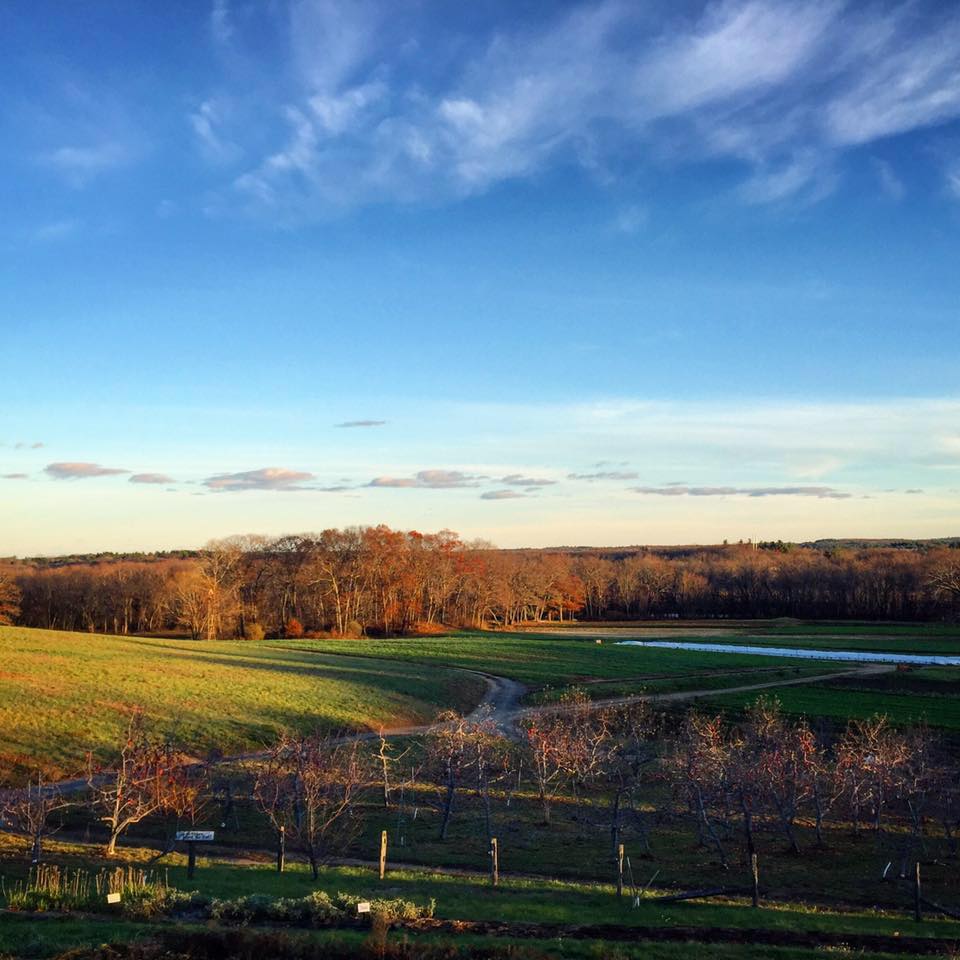greenhorns feature: resilient farming in a changing new england

by Bonnie Rubrecht
Concord, Massachusetts might be known primarily for its ties to the Revolutionary War, but today it’s a thriving and affluent Boston suburb of a population of nearly 20,000. In the midst of historic mansions and some of the most valuable property outside of Boston, Hutchins Farm has been cultivating 65 acres of organic fruit and vegetables since the early 1970s. Greenhorns had the opportunity to talk to Liza Bemis, the great-great granddaughter of Charles Hutchins, who originally purchased the land that became Hutchins Farm in 1895 for his New England dairy. Liza didn’t envision herself working on the farm she grew up on, but after six years working in an office, she was ready for a change.
“The bigger question,” Liza explained, “is how do we deal with more severe weather events? Whether it’s plant breeding, cover cropping to keep the soil in place … just this past year we had a tornado [in Concord]. What does that mean for us?”
When Liza returned to Hutchins, she began helping out with farmer’s markets and now manages all of the farm’s sales, overseeing select wholesale accounts with local restaurants, dealing with their accounting and managing their farm stand on Monument Street. Family-owned for five generations, Hutchins was originally a dairy called Punkatasset Farm. “But in our grandparents’ era, dairy in New England was dying,” Liza explained. “More than half of the land was sold off, leaving just the original homestead—about 65 acres.” The remaining land was leased out to other farmers, or used for growing hay.
Despite his parents prodding to go into a different career, Liza’s father, Gordon Bemis, was smitten with farming.
“He grew up on the homestead and was always fascinated by dirt and machinery, from really early on.” After he graduated college with an engineering degree in 1973, Gordon came home and “basically tore up the front yard to begin farming. Hutchins Farm was established the same year.” Two years later, Gordon’s brother John returned home to join him.

From the outset, Hutchins Farm set out to use organic methods. “The question they had was, can we really grow good food this way?” said Liza. “They were part of the ‘back to the land’ movement. It was all about environmentalism.” Hutchins became one of just a few farms that were part of NOFA’s (Northern Organic Farmers Association) organic certification pilot program in the 1980s. “People were very dismissive in the beginning. It wasn’t really until the business got bigger that anyone was paying attention.”
Today the farm sells every kind of vegetable that can be grown in New England, along with small fruit and organic apples, from late May through October. Even though their business grew, the farm stand remains their main source of revenue. Almost all of the produce that Hutchins sells is their own, in part as a commitment to their patrons that everything they sell is entirely organic. “Farming is an opaque system to the consumer,” Liza said. “It’s about accountability—a feeling of trust.” At their stand, Liza knows everything that has been done in order to bring the produce to market.
Hutchins Farm pre-dates the CSA (community-supported agriculture) revenue model, but their traditional direct-sales model allows for transparency and a wider range of shoppers. “I find it very difficult to take someone’s money and promise them something,” Liza said, referring to the many factors that can influence what customers receive in their CSA pick-ups. “We have people who shop with us daily, weekly, monthly or just once a season. Some of them don’t have several hundred dollars up front, and I don’t want to cut them out.”
Even with their loyal customer base, Hutchins faces challenges. Issues like new food safety regulations can be difficult to decipher, and securing steady and reliable labor remains a struggle. “Right now we are always training a new crew, and have steady turnover from summer to fall when students and college kids go back to school,” Liza said. “Although there’s plenty of applicants, it’s still difficult to retain people.”
Of course, climate change also looms large as an emerging threat, raising questions about investing in season extension equipment or whether to risk planting new or different crops less susceptible to drought or increased humidity. “The bigger question,” Liza explained, “is how do we deal with more severe weather events? Whether it’s plant breeding, cover cropping to keep the soil in place … just this past year we had a tornado [in Concord]. What does that mean for us?”
For Liza it means that the farm’s cash reserves need to be better, ready to deal with new unforeseen consequences of unpredictable weather patterns. “Farmers, as a personality type, are very involved in nature and natural systems,” she said, “whether or not they label those issues as environmental. It’s all about how much they are willing to risk.” Hutchins Farm spent money to bury irrigation lines a few years back; if they hadn’t invested then, they’d be less prepared for the drought now. “The big question is, how do you make the farm resilient? What are the infrastructure investments needed to become more resilient?”
Part of the answer lies in Liza’s response to my question about her family’s early organic efforts, when so few models were available to follow: “The funny thing about farming is that it is always trial and error. You’re always dealing with some new pathogen, pest or changing condition you haven’t before. There’s never a moment where you stop doing that."

